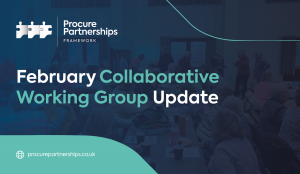Following the Queen’s speech in May 2021 one of the government’s top priorities is to deliver a national recovery from the pandemic that makes the UK stronger, healthier, and more prosperous than before. There is huge responsibility on public sector bodies to ‘build back better’ and ensure public money is well managed and spent on projects and infrastructure that benefit local communities, offer good value and promote environmental sustainability whilst upholding the four pillars of public sector procurement. This is the first year the UK will operate independently from the EU and government procurement is no longer subject to EU regulations. The UK can define how it wants to approach public sector spend, but unquestionably it will continue to support the four core principles of transparency, good management, prevention of misconduct, accountability, and control to continuously improve integrity in public procurement. The Chancellor of the Exchequer, Rishi Sunak, in his March budget announcement, spoke of several schemes that will increase the funding available for construction projects in the country’s bid to ‘level up.’ So, when a public sector body has secured grant funding, how does a procurement framework support throughout the life cycle of the project to advance expediently from project funding initiation to successful project delivery?
In this article Key Account Manager Conor Neild-Crabb, with support from Ridge and Partners, will explore how we can support the public sector to progress efficiently from grant funding stage to project delivery.
Feasibility and Grant Funding Schemes
UK procurement frameworks like Procure Partnerships specialise in supporting public sector bodies to deliver their planned targets. Our knowledge and expertise of the funding streams available to public sector bodies enables us to support public sector clients achieve their broader project objectives through strategic procurement. Grant funding can be used to demonstrate the feasibility of a project. Feasibility assessments are preliminary studies carried out in the very early stage of a project, particularly when it is large or complex. Their main purpose is to understand if the project is viable, understand the initial costs – the budget versus the client’s requirements and form a project execution plan. Securing a funding grant can help to demonstrate how the project costs will be covered. Different funding streams will concentrate on tackling different economic and social problems and will command specific project outcomes. Examples of current funding streams include:-
LEP Funding
A Local Enterprise Partnership (LEP) is a community-owned partnership between local authorities and businesses. An LEP plays a leading role in deciding local economic priorities and undertaking activities to promote economic growth and create local employment opportunities. The 38 LEPs and their local Growth Hubs are supporting over one million businesses across the country form alliances with the public sector as part of the post-pandemic recovery and have helped to build 100,000 new homes, secured £15bn of private investment, created over 180,000 new jobs and helped over 3 million young people engage with business.
The Future High Streets Fund
The Ministry of Housing, Communities & Local Government announced in May that 57 more areas have received £576m of funding, in addition to the 15 areas that received funding worth £255m in December last year. As part of the wider £3.6bn Towns Fund, the Future High Streets Fund is a government investment to financially support town centres and high streets with refurbishments and developments that will drive growth and future sustainability.
UK Infrastructure Bank
This is the UK’s post-Brexit equivalent of the European Investment Bank. A sum of £12bn of equity and debt capital to finance local authority and private sector infrastructure projects across the UK launched earlier this year. The new institution will offer a choice of financing tools including debt, hybrid products, equity and guarantees to support an estimated £40bn of private and public sector infrastructure projects and will offer loans to local authorities. It will play a vital role in the green building revolution and delivery of the National Infrastructure Strategy. It will also be able to lend to university projects that generate a return on investment to support regional and local growth and play a role in supporting and developing early-stage technologies.
The Levelling Up Fund
The Levelling Up Fund will focus investment into projects that require up to £20m of funding and will be delivered through local authorities. The UK government has pledged an initial £4bn for England over the next four years and set aside a minimum of £800m for Scotland, Wales, and Northern Ireland. Larger bids above £20m and below £50m will be accepted for transport projects. All applications must support the government’s net zero carbon emission goals, support the growth of green skills, and advocate sustainable supply chains. There is also a £220m UK Community Renewal Fund announced that aims to support pilot schemes and new approaches to invest in skills, communities, local business, and support people into employment. In addition, the £150m Community Ownership Fund is intended to help communities across the UK to support and continue benefiting from the local facilities, community assets and amenities.
MMC Taskforce
The government has announced a commitment of £10m of funding alongside a taskforce dedicated to modern methods of construction, particularly for building new homes. Based in the Ministry of Housing, Communities and Local Government’s office in Wolverhampton, the team will work closely with local authorities and metro mayors, including the West Midlands Combined Authority and the Liverpool City Region.
Skills Funding
There are several skills-based funding streams available that are relevant to the construction sector. With a skills gap crisis affecting the construction industry, the government’s announcement in March to extend and increase the payments made to employers in England who hire new apprentices is hugely beneficial. Employers who hire a new apprentice between 1st April 2021 and 30th September 2021 will receive £3,000 per recruit, compared with £1,500 per new apprentice under the previous terms. This is in addition to the existing £1,000 payment the government provides for all new 16–18-year-old apprentices. A £7m fund was also introduced last month to help employers in England set up and expand portable apprenticeships. This will enable apprentices to work across multiple projects with different employers. Support for SMEs under the new Help to Grow scheme developed in partnership with industry will also provide funding for 90% of the training costs for vocational courses delivered by UK business schools, this is advantageous for construction as much of the supply chain is made up of SMEs. Government funding of £500m a year has also been made available for the newly formed T-Levels, vocational courses for 16–19-year-olds to support them with technical qualifications to gain employment into core areas of industry.
Getting Your Project Off the Ground
Once funding has been secured and a budget defined, the next step is to appoint a professional services team to develop the scope of the design and project plan further, and where necessary obtain planning permission. The project design needs to be developed to a point where a contractor can be onboarded to progress the design and build. At this stage engagement with stakeholders and consultation with the public is crucial to obtain feedback and support for the project. Procurement routes that are best suited to the project must be explored and evaluated to ensure a main contractor can be appointed. Procurement frameworks are contracts that have been negotiated by local authorities, central government departments or public buying organisations to achieve compliant and best value agreements from suppliers, and so using a framework, particularly one that specialises in construction frameworks, is a reliable way of securing a contractor for your project. At Procure Partnerships we perform soft market engagement testing with contractors to test the market’s commercial capabilities of meeting the requirements of the project and ensure enough interested suppliers are included to maintain competitive pressures.
Once the groundwork has been laid, a tender to award a contractor can commence. Call-off methods can take the route of a ‘single-stage,’ ‘two-stage’ or ‘direct award’ approach. Single-stage tendering is a more traditional fixed cost up front approach separating design and build. Two-stage tendering is a popular method for construction contracts offering flexibility and collaboration on design and build. With a Direct Award route, a framework contractor is directly selected for a project without re-opening competition. Contractors can work under a PCSA to develop any remaining design, or the project can be fully re-priced. The latter has a big advantage where a professional services team or contractor needs to be appointed quickly to get the project off the ground as soon as funding becomes available. At Procure Partnerships our experienced procurement key account managers can help guide and assist with the best call-off method for your project.
Successful Project Delivery
Successful project delivery can be determined by a few measurables, for example, delivering within budget, on time, legal and financial compliance, achieving specific project goals and objectives and on wider aspects such as social value and environmental impact. Procuring through a UK framework and engaging with a professional procurement framework organisation will reduce overall procurement costs and reduce the workload placed on internal resources. The relationships that develop between buyers and suppliers over time ensures better value for both parties in the longer term. Procure Partnerships offer free project feasibility reviews and free project delivery support. Our strategic procurement practices allow public sector bodies to also deliver on social value and ensure projects progress efficiently from funding through to successful completion.
Matthew Drury, Associate at Ridge and Partners LLP, commented: “Once funding for a project has been secured it is often a requirement that the funding be spent, and the project delivered within a set timeframe. Specialist construction frameworks can save significant time and help projects be delivered to tight deadlines. Procurement timescales can be reduced from months to a matter of weeks with the comfort that the contractor has already been through a robust procurement process to make it onto the framework, with pre-agreed terms, conditions and rates. Specialist construction frameworks help build long term relationships with the supply chain, are flexible in the procurement approach, complaint with Public Procurement Regulations and most importantly have ESG at their heart which benefits the local community.”
Click Here To Download a Procure Partnerships Framework User Guide
Twitter
Linkedin

In Conor’s 7/8 years in the industry, he has emerged as an expert in procurement, demonstrating a profound understanding of structuring Procure Partnerships Frameworks, deciphering main contractor/consultant procurement intricacies, assessing competitor offerings, and steering special projects and new product development.



